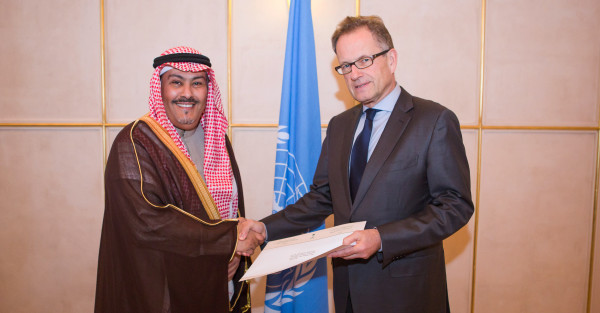PHOTO: Faisal Trad, Saudi Arabia’s Ambassador in Geneva and Chairman of the UN Human Rights Council, with Michael Møller, Director-General of the United Nations Office at Geneva
Colum Lynch writes for Foreign Policy:
Saudi Arabia and its Sunni-majority Persian Gulf allies don’t hold a single seat on the UN Security Council. But you’d hardly know it: Over the past year, they have wielded their diplomatic clout like a major power, shaping the 15-nation council’s diplomatic strategy for Yemen and effectively suppressing UN scrutiny of excesses in their 13-month air war against the country’s Shiite rebels.
The US and Britain, two of the U.N. Security Council’s five veto-wielding powers, have largely delegated Yemen crisis management to the Saudi-led Gulf Cooperation Council. But both have grown increasingly concerned in recent months that Arab armies are pursuing a reckless war that has contributed to the widespread destruction of the Middle East’s poorest country and planted the seeds for greater extremism.
An examination of Saudi Arabia’s Yemen diplomacy provides rare insights into the ways a vital US ally has been granted a privileged perch at the world’s most powerful security body. Working through its military allies — principally the United States, Britain, and Egypt — Saudi Arabia has succeeded in blocking actions to restrain its military conduct and highlight humanitarian costs of the conflict.
“They are able to shape discussion on Yemen even when they are not in the room,” Akshaya Kumar, the deputy director of UN affairs at Human Rights Watch, said. “They are able to really maintain a one-sided approach to the Security Council’s handling of the situation in Yemen and particularly relating to their abuses on which the council has been silent.”
The council’s treatment of Yemen contrasts sharply with Syria, where the United States and its Western and Arab allies have sponsored resolutions demanding the Syrian government and armed rebels provide access to relief workers. Washington and its allies have also pushed for an International Criminal Court investigation into Syrian atrocities.
But when New Zealand urged the Security Council this year to adopt a resolution demanding access for humanitarian aid workers in Yemen, it encountered stiff resistance.
Saudi Arabia’s Ambassador to the UN, Abdullah al-Mouallimi, publicly dismissed the proposal as unnecessary. Behind closed doors, Egypt placed the initiative on the back burner by urging the council to withhold action until Saudi Arabia was consulted.
Britain, which initially supported New Zealand’s initiative, reversed course and put the plan on ice. London persuaded Wellington to hold off, arguing the initiative might interfere with confidential Saudi peace talks this year with anti-government Houthi rebels. In the end, the council shelved a decision.
The current phase in Yemen’s civil war has its roots in an uprising by Shiite Houthi separatists, who seized the capital, Sanaa, in January 2015. The rebels deposed Yemen’s internationally recognized president, Abed Rabbo Mansour Hadi, and placed him under house arrest before he fled to Saudi Arabia in exile. Shortly after arriving in Riyadh, Hadi appealed to the kingdom and other Gulf countries to intervene militarily to restore him to power.

